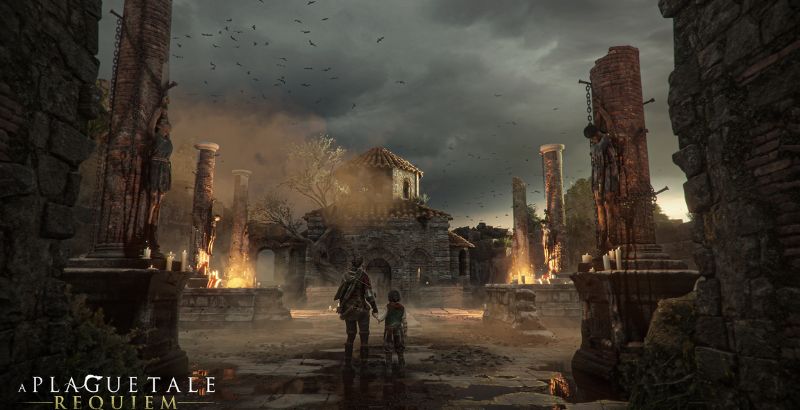
After the harrowing journey of Amicia and Hugo in A Plague Tale: Innocence, we’ve waited three years to learn about what the ending meant for the siblings and what lies ahead for Hugo’s condition. Developed by Asobo Studio and published by Focus Entertainment, A Plague Tale: Requiem picks up where Innocence left off. And if you think the last game was filled with pain, grief, and guilt, Requiem has so much more to give.
A Plague Tale: Requiem is a third-person action-adventure game that places you in the shoes of Amicia, Hugo’s older sister. In Innocence, these two fought for their lives, running from humans who wanted to capture Hugo and plague-carrying rats. Along the way, they discovered that Hugo carries an ancient bloodline curse—the Prima Macula. This curse eventually allows Hugo to control the very rats consuming the land and its people. That’s where Requiem picks up; Amicia and Hugo, along with their mother and friend Lucas, flee to the far south, attempting to start a new life and control Hugo’s curse. But when Hugo’s powers reawaken, bringing the return of the devouring rats, they’re forced to flee again. However, when Hugo begins to dream about an island that will cure the Macula, the siblings lay their last hopes on this prophetic land.
If you were hoping to jump into Requiem without playing Innocence first, you’d likely be lost. The game doesn’t offer any recap of the first and rarely refers to past events besides when Amicia or Hugo talk to new companions. While this means Requiem isn’t accessible to new players, this is a boon for Requiem’s pacing. The story progression feels absolutely natural and is never bogged down by the game going out of its way to remind players about the past.
That said, the game takes time to inform players about all the mechanics. But it’s done efficiently and whimsically with Amicia and Hugo playing make-believe. But beyond these initial mechanics, Amicia’s skills also evolve with the game’s progression, much like in Innocence. How you play directly affects what skills are unlocked. Having the players’ abilities evolve along with the story and the characters themselves is a nice touch and makes the gameplay that much more enveloping.
Requiem focuses on stealth, with Amicia’s primary weapon, a slingshot, used to distract and stun enemies. While you can kill enemies with a precise shot to the head, many enemies wear helmets or have shields, forcing a more stealthy approach, especially in the beginning. Amicia can also use alchemy; with her sling, she can set things on fire, retard flames, disorientate enemies, and lure rats. Combat becomes easier the further in the game you are, with new ways to kill becoming unlocked, but it’s still a slippery slope; enemies are not forgiving, with only two hits leading to a restart. In this way, Requiem definitely provides challenging situations; but nothing that will keep most people from progressing too slowly.
Outside of combat and stealth, there are environmental puzzles, but these are neither very extensive nor complicated. Instead, much of the puzzling extends to making your way through and around the hordes of rats and figuring out the best ways to sneak around human enemies or take them out. As a result, the overall gameplay is not much different than Innocence. Still, it never gets stale because there are plenty of ways to overcome obstacles and enemies, putting a lot of control in the player’s hands, along with adding new enemy behaviors and enemy types.

While you are forced to kill enemies at certain spots in the story, killing outside these sections has Amicia’s companions remarking on her violence. There doesn’t seem to be anything specific that comes of it other than unlocking particular skills, but the fantastic voice acting and soundtrack will absolutely make you feel guilty for taking another human’s life, even one that wants to kill you.
It’s this pathos that makes Requiem a beautifully crafted tale that deals with the many facets of what it means to be human. The true horror rarely comes from the devouring rats, but instead from the humans the children encounter. Amicia and Hugo are in a desperate struggle for survival, and their journey takes them through the very dregs of humanity. But while they meet selfish and brutal people, they also encounter kind and generous individuals; these lighthearted moments are a needed breath of fresh air after so much death and destruction. But the peace never endures, and even the kindest people can make vile compromises. The constant struggle takes a toll as Requiem deals with the cost of the siblings’ survival in a world that is simultaneously breathtaking as it is cruel. Much like its predecessor, Requiem is an amazingly moving experience and contains so many multi-faceted characters and features gorgeous landscapes, excellent voice acting, and a moving score.
That said, there were a few stumbles in this otherwise perfect narrative. Some scenes had awkward pacing, with abrupt transitions or pauses that just felt too long. While the game does well by slowing you down in certain areas to feed you just the right amount of dialogue, if you move too fast in others, dialogue from multiple characters overlaps. Additionally, I experienced a handful of graphic glitches that disrupted the immersion, and some repetitious dialogue (specifically when you’re commanding allies to help you) becomes rather annoying after a while.
But even with the handful of critiques, A Plague Tale: Requiem brings back everything to love about the first game and builds an even more heartrending tale of the things people will do for love. The landscapes are beautiful, the characters are intriguing, and how the bond between Amicia and Hugo evolves is mesmerizing. If you played A Plague Tale: Innocence, there should be nothing stopping you from grabbing A Plague Tale: Requiem.
A Plague Tale: Requiem will be available on October 18th for PC, PS5, Xbox Series X|S, and Nintendo Switch.
A Plague Tale: Requiem
-
Rating - 9/109/10
TL;DR
A Plague Tale: Requiem brings back everything to love about the first game and builds an even more heartrending tale of the things people will do for love.




